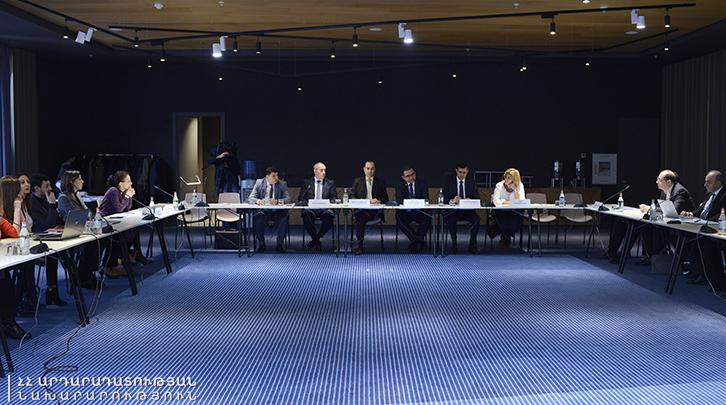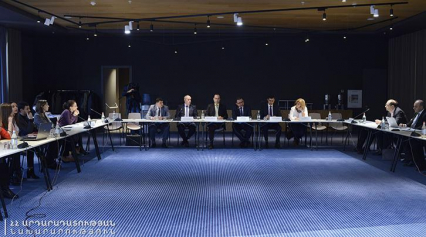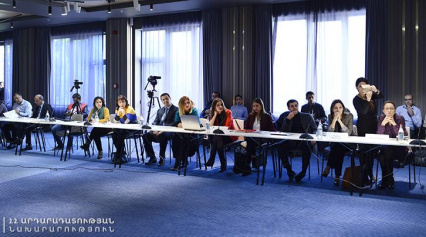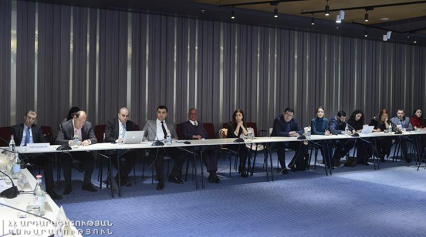Conference devoted to reduction of corruption risks in the private sector
19/11/2018

Today, a conference devoted to the programme "Reducing Corruption Risks in the Private Sector" took place with the participation of Acting Minister of Justice of the Republic of Armenia Artak Zeynalyan. The conference was held by the Ministry of Justice and "Harmonious Development" non-governmental organisation with the support of VivaCell-MTS.
The event was also attended by Acting Minister of Economic Development and Investments Tigran Khachatryan, General Manager of VivaCell-MTS Ralph Yirikian, Deputy Minister of Justice Suren Krmoyan and others.
Artak Zeynalyan greeted the participants of the conference and noted that the velvet revolution that took place in Armenia and the following events must truly be viewed as unprecedented and historic. According to him, business is among the main beneficiaries, on which the fruits of the national struggle must have a direct impact. "In this respect, as a major step, it is necessary to turn the victorious revolution of our country into institutional reforms, to which a new sweep must be brought after the upcoming elections," Artak Zeynalyan noted and added that the tactical tools used during the revolution also need to be used when implementing reforms, including for setting simple and reachable goals within specific time limits, engaging the society in the ongoing revolution, with clearly stated short-term and strategic tasks for the purpose of keeping the society as the main driving force of the ongoing revolution.
Acting Minister of Economic Development and Investments Tigran Khachatryan expressed gratitude for organising such a discussion and noted that one of the primary stimuli for engaging private investments was the absence of corruption. Tigran Khachatryan also set aside the necessary prerequisites for having a competitive private sector and emphasised the importance of solving certain problems existing in the relations between the subjects of the private sector.
According to General Manager of VivaCell-MTS Ralph Yirikian, introduction of the anti-corruption system is unquestionably important as a means of supervision over the activities of the company and is aimed at ensuring transparency and reasonableness of expenditures, predictable and regular return of investments, etc. "However, compliance with the standards of international anti-corruption systems is most effective when it constitutes a part of the value system of the employees of a company, as is the case with VivaCell-MTS. The acquisition by VivaCell-MTS of ISO 37001 and ISO 19600 international licences for anti-corruption and prevention of corruption for the first time in Armenia derives from our desire and expression of will to comply with the highest standards of corporate management at the international level, not the legal requirements set for the company," Ralph Yirikian said and emphasised that the company had done it voluntarily.
Afterwards, Deputy Minister of Justice Suren Krmoyan presented to the participants of the conference the programme "Reducing Corruption Risks in the Private Sector", after which the participants of the meeting held an interesting discussion.
Let us mention that engaging business in the fight against corruption and implementing anti-corruption measures for the private sector are among the major directions of the anti-corruption policy.
Taking into account the international commitments assumed by the Republic of Armenia, as well as the recommendations received as a result of different international assessments, which state the necessity of active steps aimed at preventing corruption in the private sector, the Ministry of Justice of the Republic of Armenia is co-operating with VivaCell-MTS within the scope of the jointly implemented programme entitled "Reducing Corruption Risks in the Private Sector".
The programme is aimed at identifying the corruption risks hindering the private sector and developing simple, innovative and modern methods for neutralisation of those risks. Within the scope of the programme, the relevant international practice has been studied and inquiries have been made by the partnering "Harmonious Development" non-governmental organisation, as a result of which innovative ideas have been compiled. The recommendations received in the course of the programme concern the tax and customs sectors, the regulations regarding receipt of licences and permits, the procurement system, etc. The recommendations received mainly envisage the creation of electronic websites, platforms, chat bots and similar mechanisms which will make the receipt of services and the exchange of information quicker and more accessible.







